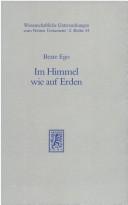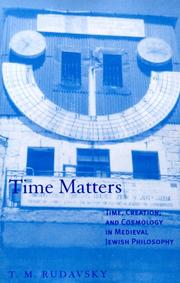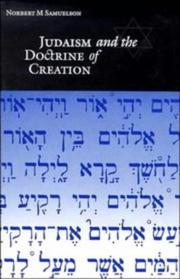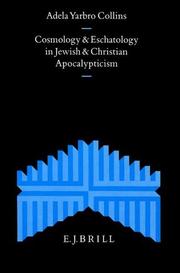| Listing 1 - 7 of 7 |
Sort by
|
Book
ISBN: 900425966X 9789004259669 9789004259652 9004259651 Year: 2014 Publisher: Leiden Boston
Abstract | Keywords | Export | Availability | Bookmark
 Loading...
Loading...Choose an application
- Reference Manager
- EndNote
- RefWorks (Direct export to RefWorks)
The study of time, astronomy, and calendars, has been closely intertwined in the history of Western culture and, more particularly, Jewish tradition. Jewish interest in astronomy was fostered by the Jewish calendar, which was based on the courses of the sun and the moon, whilst astronomy, in turn, led to a better understanding of how time should be reckoned. Time, Astronomy, and Calendars in the Jewish Tradition , edited by Sacha Stern and Charles Burnett, presents a wide selection of original research in this multi-disciplinary field, ranging from Antiquity to the later Middle Ages. Its variety of approaches and sub-themes reflects the relevance of astronomy and calendars to many aspects of Jewish, and more generally ancient and medieval, culture and social history. Contributors include: Jonathan Ben-Dov, Reimund Leicht, Marina Rustow, Francois de Blois, Raymond Mercier, Philipp Nothaft, Josefina Rodriguez Arribas, Ilana Wartenberg, Israel Sandman, Justine Isserles, Anne C. Kineret Sittig, Katharina Keim, and Sacha Stern
Jewish calendar --- Jewish astronomy --- Jewish cosmology --- Cosmology, Jewish --- Cosmology --- Astronomy, Jewish --- Hebrew astronomy --- Astronomy --- Calendar, Hebrew --- Calendar, Jewish --- Hebrew calendar --- Calendar --- Jewish chronology --- History

ISBN: 3161454030 9783161454035 Year: 1989 Volume: 34 Publisher: Tübingen Mohr Siebeck
Abstract | Keywords | Export | Availability | Bookmark
 Loading...
Loading...Choose an application
- Reference Manager
- EndNote
- RefWorks (Direct export to RefWorks)
Jewish cosmology --- Heaven --- Rabbinical literature --- History. --- Judaism --- History of doctrines. --- History and criticism. --- 296*64 --- Joods messianisme en apocalyptiek --- Theses --- 296*64 Joods messianisme en apocalyptiek --- Cosmology, Jewish --- Cosmology --- Future life --- Judaism&delete& --- History of doctrines --- History --- History and criticism --- Jewish cosmology - History. --- Heaven - Judaism - History of doctrines. --- Rabbinical literature - History and criticism.

ISBN: 0791493253 9780791493250 9780791444542 0791444546 0791444538 0791444546 9780791444535 Year: 2000 Publisher: Albany State university of New York press
Abstract | Keywords | Export | Availability | Bookmark
 Loading...
Loading...Choose an application
- Reference Manager
- EndNote
- RefWorks (Direct export to RefWorks)
Traces the development of the concepts of time, cosmology, and creation in medieval Jewish philosophy.
Jewish cosmology. --- Creation --- Time. --- Philosophy, Medieval. --- Jewish philosophy. --- Hours (Time) --- Geodetic astronomy --- Nautical astronomy --- Horology --- Medieval philosophy --- Scholasticism --- Jews --- Philosophy, Jewish --- Philosophy, Israeli --- Cosmology, Jewish --- Cosmology --- History of doctrines. --- Philosophy --- Jewish cosmology --- Jewish philosophy --- Philosophy, Medieval --- Time --- History of doctrines --- Creation - History of doctrines
Book
ISBN: 0812294793 0812249909 Year: 2018 Publisher: Philadelphia : University of Pennsylvania Press,
Abstract | Keywords | Export | Availability | Bookmark
 Loading...
Loading...Choose an application
- Reference Manager
- EndNote
- RefWorks (Direct export to RefWorks)
Sefer Yeṣirah, or "Book of Formation," is one of the most influential Jewish compositions of late antiquity. First attested to in the tenth century C.E. and attributed by some to the patriarch Abraham himself, Sefer Yeṣirah claims that the world was created by the powers of the decimal number system and the twenty-two letters of the Hebrew alphabet. This short, enigmatic treatise was considered canonical by Jewish philosophers and Kabbalists and has fascinated Western thinkers and writers as diverse as Leibnitz and Borges. Nonetheless, Sefer Yesirah is nearly impossible to contextualize, mainly owing to its unique style and the fact that it does not refer to, nor is it referenced by, any other source in late antiquity. After a century and a half of modern scholarship, the most fundamental questions regarding its origins remain contested: Who wrote Sefer Yeṣirah? Where and when was it written? What was its "original" version? What is the meaning of this treatise?In "Sefer Yeṣirah" and Its Contexts, Tzahi Weiss explores anew the history of this enigmatic work. Through careful scrutiny of the text's evolution, he traces its origins to the seventh century C.E., to Jews who lived far from rabbinic circles and were familiar with the teachings of Syriac Christianity. In addition, he examines the reception of Sefer Yeṣirah by anonymous commentators and laypeople who, as early as the twelfth century C.E., regarded Sefer Yeṣirah as a mystical, mythical, or magical treatise, thus significantly differing from the common rabbinic view in that period of the text as a philosophical and scientific work. Examined against the backdrop of this newly sketched historical context, Sefer Yeṣirah provides a unique and surprising aperture to little-known Jewish intellectual traditions of late antiquity and the early Middle Ages which, despite their distance from the rabbinic canon, played a vital role in the development of medieval Jewish learning and culture.
Cabala --- Jewish cosmology. --- Cosmology, Jewish --- Cosmology --- Sefer Yeẓirah. --- Sepher Jeṣirah --- Yetzirah --- Yezirah --- Yetsirah --- Sepher Yetzirah --- Sfr Isiré --- Yeẓirah, Sefer --- Sefer Yetsirah --- Book of Formation --- Sepher Yezirah --- Sefer Yetzirah --- Book of Creation --- Sefer Jecira --- Chronicles of desire --- Sefer Yetzira --- Sefer Yeṣirah --- ספר יצירה --- Jewish Studies. --- Religion. --- Religious Studies.
Book
ISBN: 1282949241 9786612949241 9004181105 9789004181106 9789004167629 9004167625 9781282949249 6612949244 Year: 2010 Publisher: Leiden Boston Brill
Abstract | Keywords | Export | Availability | Bookmark
 Loading...
Loading...Choose an application
- Reference Manager
- EndNote
- RefWorks (Direct export to RefWorks)
Sefer Hakhmoni by the 10th-century Jewish polymath Shabbatai Donnolo is one of the first texts written in Hebrew in medieval Europe and one of the most important documents of the “Hebrew Renaissance” of Byzantine Jewry in southern Italy between the 9th and the 11th centuries. Written as a commentary on Sefer Yeîirah (Book of Formation, an anonymous text probably written in Palestine between the Third and the 6th centuries), Sefer Hakhmoni is in fact a much more complex work, consisting of biblical exegesis, astrology, medicine, a detailed analysis of the neo-Platonic idea of melothesia , and the correspondence between the elements of the microcosm and macrocosm. This volume offers the critical text, an annotated English translation, and a comprehensive introduction to Donnolo and his works.
Cabala. --- Jewish astrology. --- Jewish cosmology. --- Cosmology, Jewish --- Cosmology --- Astrology, Jewish --- Astrology --- Cabbala --- Jews --- Kábala --- Kabalah --- Kabbala --- Kabbalah --- Qabalah --- Jewish literature --- Magic --- Mysticism --- Cabala --- Judaism --- Donnolo, Shabbetai, --- Sefer Yeẓirah. --- Sepher Jeṣirah --- Yetzirah --- Yezirah --- Yetsirah --- Sepher Yetzirah --- Sfr Isiré --- Yeẓirah, Sefer --- Sefer Yetsirah --- Book of Formation --- Sepher Yezirah --- Sefer Yetzirah --- Book of Creation --- Sefer Jecira --- Chronicles of desire --- Sefer Yetzira --- Sefer Yeṣirah --- ספר יצירה --- Jewish astrology --- Jewish cosmology --- Donnolo, Shabbetai, - 913-approximately 982. - Sefer ḥakhmoni

ISBN: 0521452147 0521046858 051159819X Year: 1994 Publisher: Cambridge : Cambridge University Press,
Abstract | Keywords | Export | Availability | Bookmark
 Loading...
Loading...Choose an application
- Reference Manager
- EndNote
- RefWorks (Direct export to RefWorks)
The topic of this book is 'creation'. It breaks down into discussions of two distinct, but interrelated, questions: what does the universe look like, and what is its origin? The opinions about creation considered by Norbert Samuelson come from the Hebrew scriptures, Greek philosophy, Jewish philosophy and contemporary physics. His perspective is Jewish, liberal and philosophical. It is 'Jewish' because the foundation of the discussion is biblical texts interpreted in the light of traditional rabbinic texts. It is 'philosophical' because the subject matter is important in both past and present philosophical texts, and to Jewish philosophy in particular. Finally, it is 'liberal' because the authorities consulted include heterodox as well as orthodox Jewish sources. The ensuing discussion leads to original conclusions about a diversity of topics, including the limits of human reason and religious faith, and the relevance of scientific models to religious doctrine.
Cosmologie judaïque --- Cossmology [Jewish ] --- Filosofie [Joodse ] --- Jewish cosmology --- Jewish philosophy --- Joodse filosofie --- Joodse kosmologie --- Kosmologie [Joodse ] --- Philosophie juive --- Philosophy [Jewish ] --- 296*63 --- Philosophy, Jewish --- Creation --- -Rabbinical literature --- -Hebrew literature --- Jewish literature --- Biblical cosmogony --- Cosmogony --- Natural theology --- Teleology --- Beginning --- Biblical cosmology --- Creation windows --- Creationism --- Evolution --- Jews --- Philosophy, Israeli --- Cosmology, Jewish --- Cosmology --- Joodse theologie en filosofie--in de moderne en hedendaagse tijd --- History of doctrines --- History and criticism --- Philosophy --- -Joodse theologie en filosofie--in de moderne en hedendaagse tijd --- 296*63 Joodse theologie en filosofie--in de moderne en hedendaagse tijd --- -Jews --- Rabbinical literature --- Jewish cosmology. --- Creation - History of doctrines. --- Arts and Humanities --- Religion --- Jewish philosophy. --- History of doctrines. --- History and criticism.

ISBN: 9004105875 9789004105874 9789004493889 9004493883 Year: 1996 Volume: 50 Publisher: Leiden; Boston : BRILL
Abstract | Keywords | Export | Availability | Bookmark
 Loading...
Loading...Choose an application
- Reference Manager
- EndNote
- RefWorks (Direct export to RefWorks)
This volume deals with Jewish and Christian apocalyptic texts and movements from the second century BCE through the fourth century CE. It focuses on two major themes, cosmology and eschatology; that is, views of structure of the universe including its religious function and interpretations of history and the future. The detailed historical and literary analysis of these themes are introduced by an essay on the cultural gap between the original contexts of these texts and those of readers today and how that gap may be bridged. The book deals with the interrelations between post-biblical Judaism and early Christianity. The relevant Jewish texts and history are discussed thoroughly in their own right. The Christian material is approached in a way which shows both its continuity with Jewish tradition and its distinctiveness.
Cosmologie judaïque --- Cossmology [Jewish ] --- Eschatologie [Joodse ] --- Eschatologie judaïque --- Eschatology [Jewish ] --- Getallen--Symboliek --- Getallensymboliek --- Jewish cosmology --- Joodse kosmologie --- Kosmologie [Joodse ] --- Nombres--Symbolisme --- Symbolism of numbers --- Symbolisme des nombres --- Apocalyptic literature --- Jewish cosmology. --- Eschatology, Jewish. --- Eschatology --- Symbolism of numbers. --- Son of Man --- Littérature apocalyptique --- Cosmologie juive --- Eschatologie juive --- Eschatologie --- Fils de l'homme --- History and criticism. --- History of doctrines --- Histoire et critique --- Histoire des doctrines --- Bible. --- Criticism, interpretation, etc. --- Critique, interprétation, etc. --- Eschatology, Jewish --- History and criticism --- 228 --- 113/119 --- -Eschatology --- -Eschatology, Jewish --- -Symbolism of numbers --- 236 --- Number symbolism --- Sacred numbers --- Symbolic numbers --- Numerals --- Cosmology, Jewish --- Cosmology --- Last things (Theology) --- Religious thought --- Theology, Doctrinal --- Literature, Apocalyptic --- Literature --- Apocalyps. Boek der Openbaring van Johannes. Apocalyptiek --- Kosmologie. Natuurfilosofie. Filosofie van de natuur --- -History of doctrines --- -Eschatologie. De novissimis --- 113/119 Kosmologie. Natuurfilosofie. Filosofie van de natuur --- Littérature apocalyptique --- Critique, interprétation, etc. --- Eschatologie. De novissimis --- Abūghālimsīs --- Apocalipse (Book of the New Testament) --- Apocalisse (Book of the New Testament) --- Apocalypse (Book of the New Testament) --- Apocalypse of John --- Apocalypse of St. John --- Apocalypsis Johannis --- Apocalypsis S. Johannis --- Apokalypse (Book of the New Testament) --- Apokalypsin --- Book of Revelation --- Johannes-Apokalypse --- Johannesapokalypse --- Johannesoffenbarung --- Offenbarung des Johannes --- Revelation (Book of the New Testament) --- Revelation of St. John --- Revelation of St. John the Divine --- Revelation to John --- Ruʼyā (Book of the New Testament) --- Sifr al-Ruʼyā --- Yohan kyesirok --- Primitive and early church, ca. 30-600 A.D. --- Eschatology - History of doctrines - Early church, ca. 30-600. --- Son of Man - History of doctrines - Early church, ca.30-600. --- Apocalyptic literature - History and criticism --- Eschatology - History of doctrines - Early church, ca. 30-600 --- Son of Man - History of doctrines - Early church, ca.30-600 --- Apokalipsa św. Jana --- Apokalipsa świętego Jana
| Listing 1 - 7 of 7 |
Sort by
|

 Search
Search Feedback
Feedback About UniCat
About UniCat  Help
Help News
News